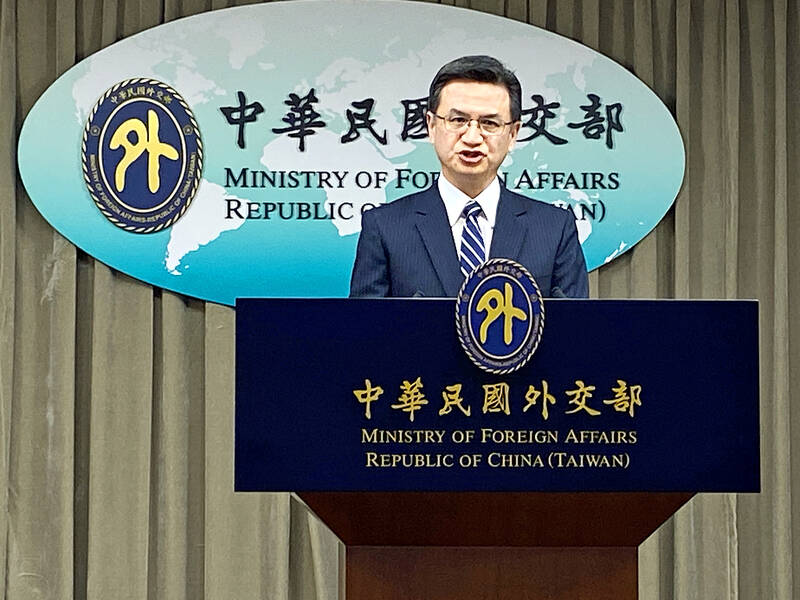All of Taiwan’s former diplomatic allies, apart from two African states, are repaying loans owed to Taiwanese banks in accordance with their contracts, the Ministry of Foreign Affairs said yesterday.
Ministry spokesman Jeff Liu (劉永健) said that all funds loaned to former allies were part of commercial agreements with Taiwanese banks and the ministry had only been the facilitator.
Like all commercial loans, the contracts stated the rights and responsibilities of both parties, including dispute settlement mechanisms, Liu said.

Photo: Yang Yao-ju, Taipei Times
The ending of diplomatic ties does not affect the validity of these contracts, so the former allies still have to repay the loans, he said, citing information given by Taiwanese banks.
Almost all of these former allies have been doing so, including Honduras, with only two exceptions — the Central African Republic and the Democratic Republic of the Congo, Liu said.
If a breach of contract occurs, banks can use international judicial channels to take legal action, a standard practice when disputes arise regarding commercial loans, Liu said.
Liu said this was why a Taiwanese bank had filed and won a lawsuit against the two nations.
He was referring to an April 2017 ruling that saw Export-Import Bank of the Republic of China successfully sue the two African nations for US$212 million in unpaid loans taken out when Taiwan still had diplomatic relations with them.
However, the two subsequently failed to begin repayments and the Taiwanese bank is currently investigating other methods to recover the assets, the ministry said.
Taiwan ended diplomatic ties with the Democratic Republic of the Congo in 1973 and the Central African Republic in 1998.
Liu made the remarks during a briefing when he was asked to comment on a Honduran media report released last week that said the Central American nation still owed Taiwanese banks US$449 million after ending diplomatic ties.
The funds from Taiwan were used for property reconstruction, school infrastructure, school meals and other projects, Spanish-language newspaper La Prensa reported.

Alain Robert, known as the "French Spider-Man," praised Alex Honnold as exceptionally well-prepared after the US climber completed a free solo ascent of Taipei 101 yesterday. Robert said Honnold's ascent of the 508m-tall skyscraper in just more than one-and-a-half hours without using safety ropes or equipment was a remarkable achievement. "This is my life," he said in an interview conducted in French, adding that he liked the feeling of being "on the edge of danger." The 63-year-old Frenchman climbed Taipei 101 using ropes in December 2004, taking about four hours to reach the top. On a one-to-10 scale of difficulty, Robert said Taipei 101

Nipah virus infection is to be officially listed as a category 5 notifiable infectious disease in Taiwan in March, while clinical treatment guidelines are being formulated, the Centers for Disease Control (CDC) said yesterday. With Nipah infections being reported in other countries and considering its relatively high fatality rate, the centers on Jan. 16 announced that it would be listed as a notifiable infectious disease to bolster the nation’s systematic early warning system and increase public awareness, the CDC said. Bangladesh reported four fatal cases last year in separate districts, with three linked to raw date palm sap consumption, CDC Epidemic Intelligence

US climber Alex Honnold left Taiwan this morning a day after completing a free-solo ascent of Taipei 101, a feat that drew cheers from onlookers and gained widespread international attention. Honnold yesterday scaled the 101-story skyscraper without a rope or safety harness. The climb — the highest urban free-solo ascent ever attempted — took just more than 90 minutes and was streamed live on Netflix. It was covered by major international news outlets including CNN, the New York Times, the Guardian and the Wall Street Journal. As Honnold prepared to leave Taiwan today, he attracted a crowd when he and his wife, Sanni,

Taiwanese and US defense groups are collaborating to introduce deployable, semi-autonomous manufacturing systems for drones and components in a boost to the nation’s supply chain resilience. Taiwan’s G-Tech Optroelectronics Corp subsidiary GTOC and the US’ Aerkomm Inc on Friday announced an agreement with fellow US-based Firestorm Lab to adopt the latter’s xCell, a technology featuring 3D printers fitted in 6.1m container units. The systems enable aerial platforms and parts to be produced in high volumes from dispersed nodes capable of rapid redeployment, to minimize the risk of enemy strikes and to meet field requirements, they said. Firestorm chief technology officer Ian Muceus said